山东省临淄外国语实验学校七年级英语下册《Unit 4 What time do you go to school》教学设计 鲁教版
- 格式:doc
- 大小:183.50 KB
- 文档页数:19
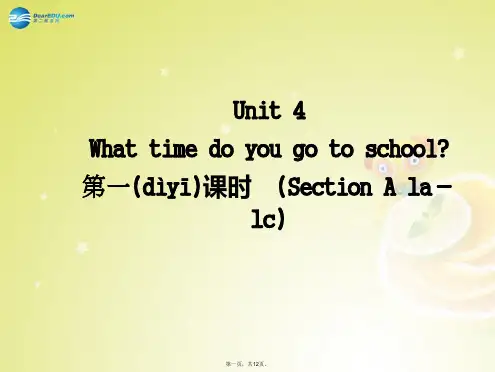
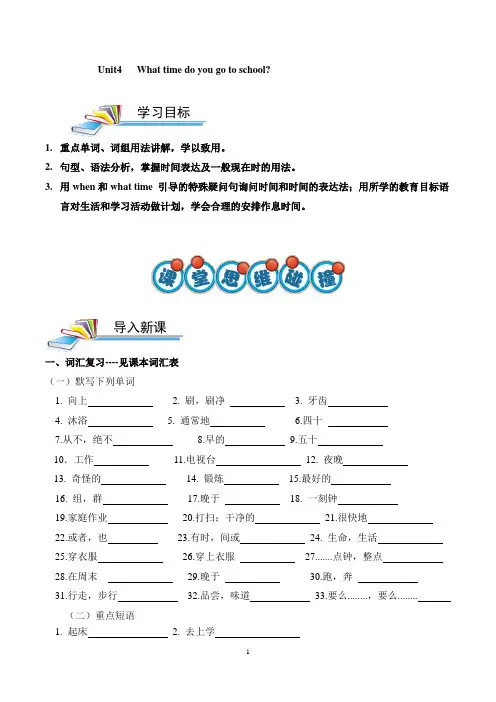
Unit4 What time do you go to school?学习目标1.重点单词、词组用法讲解,学以致用。
2.句型、语法分析,掌握时间表达及一般现在时的用法。
3.用when和what time 引导的特殊疑问句询问时间和时间的表达法;用所学的教育目标语言对生活和学习活动做计划,学会合理的安排作息时间。
导入新课一、词汇复习----见课本词汇表(一)默写下列单词1. 向上2. 刷,刷净3. 牙齿4. 沐浴5. 通常地6.四十7.从不,绝不8.早的9.五十10.工作11.电视台12. 夜晚13. 奇怪的14. 锻炼15.最好的16. 组,群17.晚于18. 一刻钟19.家庭作业20.打扫;干净的21.很快地22.或者,也23.有时,间或24. 生命,生活25.穿衣服26.穿上衣服27.......点钟,整点28.在周末29.晚于30.跑,奔31.行走,步行32.品尝,味道33.要么........,要么........(二)重点短语1. 起床____ _____2. 去上学___ _______3. 穿衣服_______4. 刷牙__ ______5. 吃早餐_________6. 洗澡_ _____7. 大量8. 散步__ ____9. 因…….迟到10.需要做某事11. 广播台____ _____ 12.有时间做某事___ _______13. 做家庭作业_______ 14. 从…..到……__ ______15.吃晚饭_________ 16.打扫我的房间_ _____1 7.保持好牙齿 1 8. 在周末__ ____新知探究生成一、重难点解析1.What time do you usually take a shower, Rick?【点拨】What time + do/does +主语+动词原形?句型,回答要用具体时间。
Eg: ----What time do you get up? ----I get up at six o’clock.【拓展】What time 还可用来询问此刻的时间。
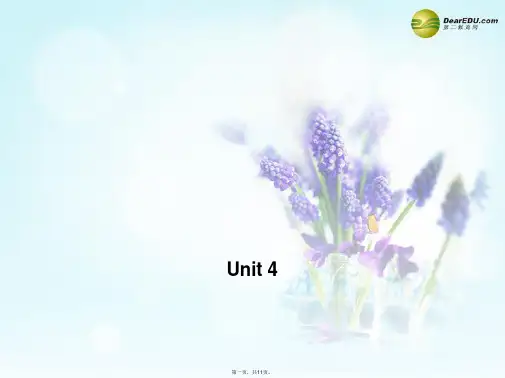

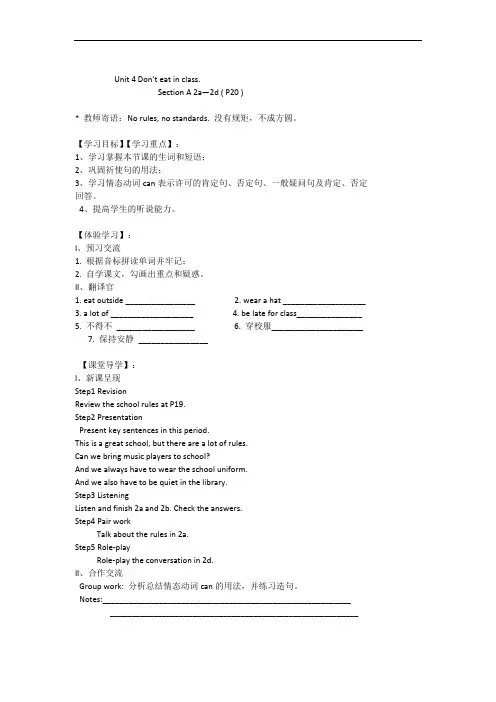
Unit 4 Don’t eat in class.Section A 2a—2d ( P20 )* 教师寄语:No rules, no standards. 没有规矩,不成方圆。
【学习目标】【学习重点】:1、学习掌握本节课的生词和短语;2、巩固祈使句的用法;3、学习情态动词can表示许可的肯定句、否定句、一般疑问句及肯定、否定回答。
4、提高学生的听说能力。
【体验学习】:I、预习交流1. 根据音标拼读单词并牢记;2. 自学课文,勾画出重点和疑惑。
II、翻译官1. eat outside ________________2. wear a hat ___________________3. a lot of ___________________4. be late for class_______________5. 不得不__________________6. 穿校服_____________________7. 保持安静________________【课堂导学】:I、新课呈现Step1 RevisionReview the school rules at P19.Step2 PresentationPresent key sentences in this period.This is a great school, but there are a lot of rules.Can we bring music players to school?And we always have to wear the school uniform.And we also have to be quiet in the library.Step3 ListeningListen and finish 2a and 2b. Check the answers.Step4 Pair workTalk about the rules in 2a.Step5 Role-playRole-play the conversation in 2d.II、合作交流Group work: 分析总结情态动词can的用法,并练习造句。
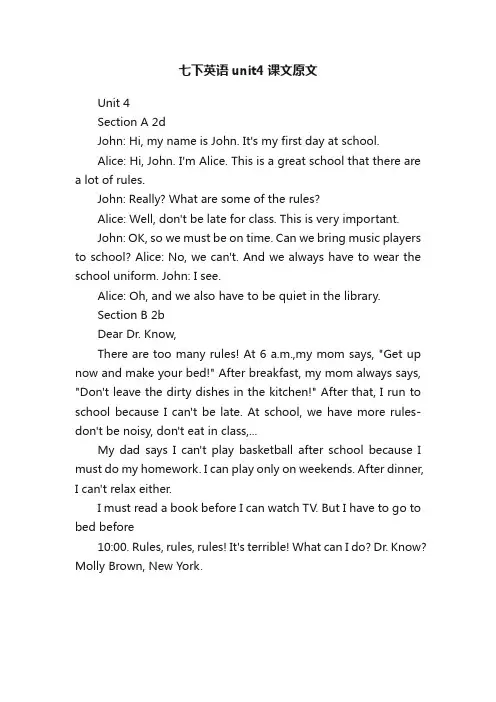
七下英语unit4课文原文Unit 4Section A 2dJohn: Hi, my name is John. It's my first day at school.Alice: Hi, John. I'm Alice. This is a great school that there are a lot of rules.John: Really? What are some of the rules?Alice: Well, don't be late for class. This is very important.John: OK, so we must be on time. Can we bring music players to school? Alice: No, we can't. And we always have to wear the school uniform. John: I see.Alice: Oh, and we also have to be quiet in the library.Section B 2bDear Dr. Know,There are too many rules! At 6 a.m.,my mom says, "Get up now and make your bed!" After breakfast, my mom always says, "Don't leave the dirty dishes in the kitchen!" After that, I run to school because I can't be late. At school, we have more rules-don't be noisy, don't eat in class,...My dad says I can't play basketball after school because I must do my homework. I can play only on weekends. After dinner, I can't relax either.I must read a book before I can watch TV. But I have to go to bed before10:00. Rules, rules, rules! It's terrible! What can I do? Dr. Know? Molly Brown, New York.。
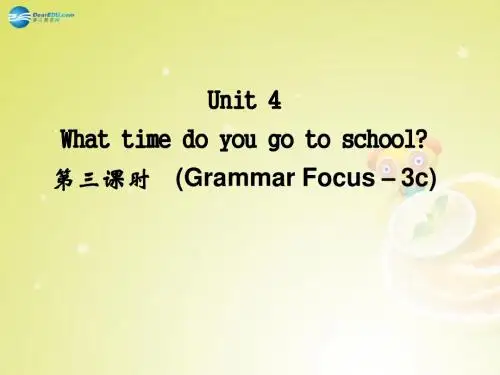
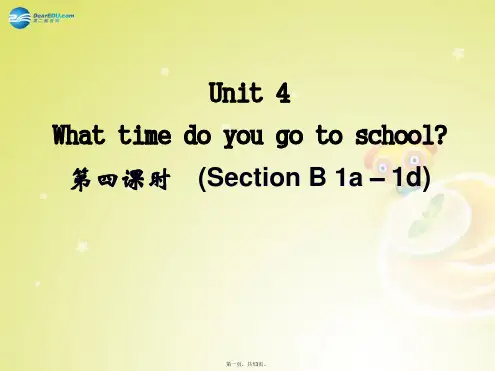
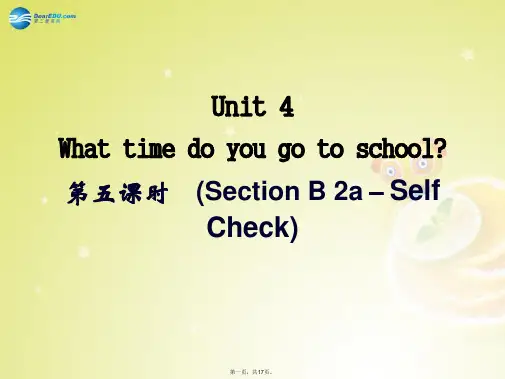
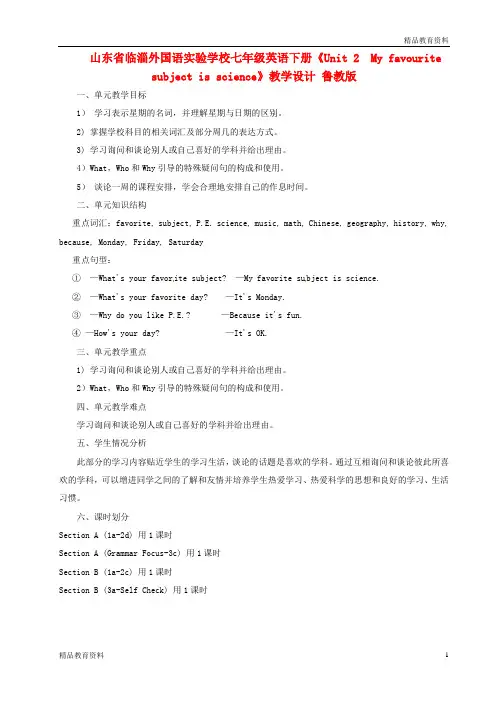
山东省临淄外国语实验学校七年级英语下册《Unit 2 My favourite subject is science》教学设计鲁教版一、单元教学目标1)学习表示星期的名词,并理解星期与日期的区别。
2) 掌握学校科目的相关词汇及部分周几的表达方式。
3) 学习询问和谈论别人或自己喜好的学科并给出理由。
4)What,Who和Why引导的特殊疑问句的构成和使用。
5)谈论一周的课程安排,学会合理地安排自己的作息时间。
二、单元知识结构重点词汇:favorite, subject, P.E. science, music, math, Chinese, geography, history, why, because, Monday, Friday, Saturday重点句型:① —What's your favor ite subject? —My favorite su bject is science.② —What's your favorite day? —It's Monday.③ —Why do you like P.E.? —Because it's fun.④ —How's your day? —It's OK.三、单元教学重点1) 学习询问和谈论别人或自己喜好的学科并给出理由。
2)What,Who和Why引导的特殊疑问句的构成和使用。
四、单元教学难点学习询问和谈论别人或自己喜好的学科并给出理由。
五、学生情况分析此部分的学习内容贴近学生的学习生活,谈论的话题是喜欢的学科。
通过互相询问和谈论彼此所喜欢的学科,可以增进同学之间的了解和友情并培养学生热爱学习、热爱科学的思想和良好的学习、生活习惯。
六、课时划分Section A (1a-2d) 用1课时Section A (Grammar Focus-3c) 用1课时Section B (1a-2c) 用1课时Section B (3a-Self Check) 用1课时课题名称Unit 2 My favorite subject is science.主备人李静周次第一周备课时间 3.10 组长签字教学目标1. 语言知识目标:1) 能掌下列词汇:favorite, subject, P.E. science, music, math, Chinese, geography, history, why, because, Monday, Friday, Saturday2) 能掌握以下句型:①—What's your favorite subject? —My favorite subject is science.②—What's your favorite day? —It's Monday.③—Why do you like P.E.? —Because it's fun.④—How's your d ay? —It's OK.3) 能就所喜欢的科目这一话题进行问答交流,正确表达自己的情感。

鲁科版七年级下册英语第四单元作文In the fourth unit of the Luoke Edition English textbook for seventh grade, students are introduced to the topic of "My Daily Routine". This unit focuses on teaching students how to talk about their daily activities, including getting up, going to school, eating meals, doing homework, and going to bed. In this unit, students will also learn how to use time-related expressions and adverbs to describe the sequence of their daily routine.To begin with, students will learn how to ask and answer questions about daily routines, such as "What time do you get up?" and "What do you do in the morning?" They will also learn how to use time expressions like "in the morning", "at noon", "in the afternoon", "in the evening", and "at night" to describe their daily activities. Through various exercises and activities, students will practice using these expressions to talk about their own daily routines and those of their classmates.Furthermore, students will learn how to use adverbs of frequency, such as "always", "usually", "often", "sometimes", "rarely", and "never", to talk about how often they do certain activities. They will also learn how to use the present simple tense to describe habitual actions in their daily routine. Through role-plays and group discussions, students will have the opportunity to practice using these adverbs and verb tenses to talk about their own habits and routines.In addition, this unit will also cover the use of transition words and phrases to describe the sequence of daily activities. Students will learn how to use words like "first", "then", "next", "after that", and "finally" to organize the steps of their daily routine. They will also learn how to use the present continuous tense to talk about actions that are happening at the moment of speaking, such as "I am eating breakfast" or "She is doing her homework".Overall, the fourth unit of the Luoke Edition English textbook for seventh grade provides students with the necessary vocabulary and grammar structures to talk about their daily routines in English. By the end of this unit, students will be able to confidently describe their own daily activities, as well as understand and respond to questions aboutthe daily routines of others. This unit aims to help students develop their speaking and listening skills, as well as their ability to use time-related expressions and adverbs to talk about habitual actions. Through a variety of interactive and engaging activities, students will have the opportunity to practice and reinforce their understanding of the language points covered in this unit.。
山东省临淄外国语实验学校七年级英语下册《Unit 8 I'm watching TV.》教学设计鲁教版一、单元教学目标1) 能掌握以下单词: newspaper, use, soup, wash, movie, just能掌握以下句型:①—What are you doing? —I'm watching TV.②—What's he doing? —He's using the computer.③—What are they doing? —They're listening to a CD.④—This is Jenny. —It's Laura here.2) 能掌握语法:现在进行时态的用法。
3) 能运用所学的知识,描述人们正在干的事情。
4)掌握现在时行时态的结构及用法。
5)掌握动词的现在分词形式的构成方式。
能掌握以下句型:①—What’s he/she doing? —She's/He's washing the clothes.②—What are they doing? —They are listening to a CD.③—Is he reading a newspaper? —Yes, he is./No, he isn't.④—Are they using the computer? —Yes, they are./ No, they aren't.二、单元知识结构重点词汇:newspaper,soup , movie , house , tea , pool , shop, supermaket , man ,race,state, the United Stated , child , use , wash , drink , study , miss, wish , Amercian,special, any , other , other , young , delicious , just , tomorrow, still . 重点短语: living room , read a newspaper, talk on the phone , make soup , TV show , eat out , make dinner , drink tea, on weekends , dragon boat race ,重点句型:—What are you doing? —I'm watching TV.—What's he doing? —He's using the computer.—What are they doing? —They're listening to a CD.—This is Jenny. —It's Laura here.三、单元教学重点1) 掌握现在进行时态的结构及用法。
山东省临淄外国语实验学校七年级英语下册《Unit 4 What time do you go to
school》教学设计鲁教版
一、单元教学目标
1) 掌握时间的简单表达方式。
2) 学习询问和谈论时间和制订作息时间表。
3)通过不同形式的练习方式来训练及熟练运用用频率副词谈论自己日常生活及日常作息习惯。
4)通过听、说、读的训练来提高学生们综合运用英语的能力。
二、单元知识结构
1) 能掌握以下单词:
up, get up, dress, get dressed, brush, tooth (pl. teeth) brush teeth, shower, take a shower, usually, forty, fifty, wow, never, early, job, work, station, radio station, o'clock, funny, exercise
2)能掌握以下句型:
①—What time do you usually get up? —I usually get up at six thirty.
②—When do you go to work? —I usually go to work at eleven o'clock.
③—He has an interesting job. —He works at a radio station.
3)能掌握以下语法:
what time和when引导的疑问句询问时间;运用数词表达时间。
“时间的询问和表达法”以及它在具体事务中的运用。
掌握两种时间和数字表达法
三、单元教学重点
1) 让学生们掌握另外两种表达时间的方式。
2) 掌握运用本节课所学习的一些日常活动的表达方式。
3) 通过听、说、读的训练来提高学生们综合运用英语的能力。
4)总结归纳用频率副词谈论自己日常生活及日常作息习惯的句型。
5)通过不同形式的练习方式来训练及熟练运用用频率副词谈论自己日常生活及日常作息习惯。
四、单元教学难点
1)能听懂学习到的日常活动的时间安排。
2)通过阅读短文,综合学习运用本单元所学习的句型句式,提高学生们的综合英语水平。
3)复习运用what time和when引导的疑问句询问时间;运用数词表达时间。
五、学生情况分析
本部分的话题是“日常作息时间”,学习内容贴近学生的生活,因为学生的作息时间安排是非常有规律的。
通过互相询问或谈论自己或对方的作息时间安排和活动计划,可以培养学生良好的作息习惯和守时习惯。
我们这级初一学生相对来说英语基础还是可以的,而且在本单元可以设计几个比较吸引学生的活动,让学生在玩中把知识学会!
六、课时划分
The 1st period: Section A: 1a、2a、1b、1cc
The 2nd period: Section A: 2b、2c 、2d、Self check 3
The 3rd period: Section A: 3a、3b、Section B :1、2a、2b
The 4th period : Section B :3a、3b、4、Self check 1.2
导学生回答,从而引出本部分的重点目标句型。
nversation in 2d. ______________
________ + does + __________
You: What time do you usually get up?
screen.
十二点差一刻,
healthy. What activities are unhealthy.
period.
一句。
其他的句子按时间的先后,逐步地确定了。
4. Check the answers
mak
第四单元质量检测
单元质量检测命题人:张晓丽
单元质量检测时间:2013.4.3
单元质量检测试题简要分析:
一:听力
听力内容围绕Unit 4 谈论时间,以及如何询问时间等展开。
二:单选
对于本单元的基本语法结构,和口语表达进行巩固检测。
三:完形填空
主要考查词语搭配,联系前后文,以及近义词辨析,句型转换以及习惯用法等,也有对学生运用知识能力进行考查,拓展词汇量。
四:阅读理解:
本单元的阅读理解主要对于日期和时间的话题进行进一步拓展延伸。
阅读理解主要考查学生的词汇量和阅读理解能力,它要求学生能够读懂原文,关注其中的细节东西和隐含的条件,再根据选择题的提问,结合一些日常生活常识选择出恰当的答案!这就要求学生多背单词,短语扩展自己的知识面!
五:根据句意和首字母提示完成单词
本题主要围绕该单元单词,考查单词的拼写外,再考查对该单词以及整个句子的意思进行判断,理解、灵活运用词语的能力。
六:用所给动词的适当形式填空:
本题主要考查学生对于动词的各种变换形式的掌握,比如名词的单复数,形容词以及副词之间的转换,动词的第三人称单数的变化和名词的所有格等。
七:句型转换
主要考查对时间询问句型的掌握,如何提问以及如何回答,还有固定的短语搭配考查等等。
八:汉译英,每空一词
主要考查学生对句型的掌握情况,给出汉语意思然后在相应的地方填出单词。
九:书面表达
主要考查学生的审题能力和语言组织能力,加强学生对英语知识学以致用。
如何更好地转换成文章,如何就时间进行提问等。
附:单元质量检测试题
第四单元质量检测分析
一、基本状况:
(平均分、及格率和高分率以及试卷每个板块乃至每道题的得失分率)
二、存在问题及原因分析:
三、补救措施:
四、质量检测小结。